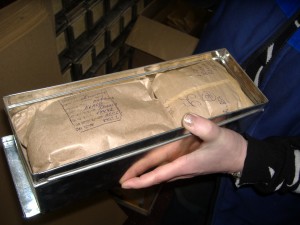- India finally arrives, gets french fries.
- Sophisticated urbanites tap maples.
- Raise a rare heirloom breed. Then cook it.
- “Some might be hoping he will predict a return to the glory days of the “truly unique” strain of Petitcodiac salmon, which now likely exists only in a gene bank at the Mactaquac Fish Hatchery at this point.”
- Boffins identify world’s first cocktail.
- How people turned from nut collectors into rice farmers in China.
- Hungarians sacrificed dogs.
Portal back in time contains agrobiodiversity
Sure, the story of the sinkhole with 12,000 years’ worth of clues about the life of some of America’s first residents is fascinating. But what we all want to know is what kind of gourd is it, exactly?
All you can eat
Is there any ethnic food concoction that says (agro)biodiversity quite like smörgåsbord?
LATER: With vodka, of course.
Rainbow breeds
All of these variants in color should be noted and celebrated, but should also be guarded by the breeders to be certain that all of them can be available to future breeders. Past breeders bequeathed this wealth of variation and adaptation to the present generation – and it is important that each generation guard the resource and present it to the next generation as a useful and viable genetic resource.
Virtual visit to VIR
Click on the picture for some impressions from my recent visit to the N.I. Vavilov Institute Research Institute for Plant Industry in St Petersburg, Russia on the occasion of a SEEDNet meeting. A veritable monument to agrobiodiversity. And don’t forget Nikolai Ivanovich has a voice.
